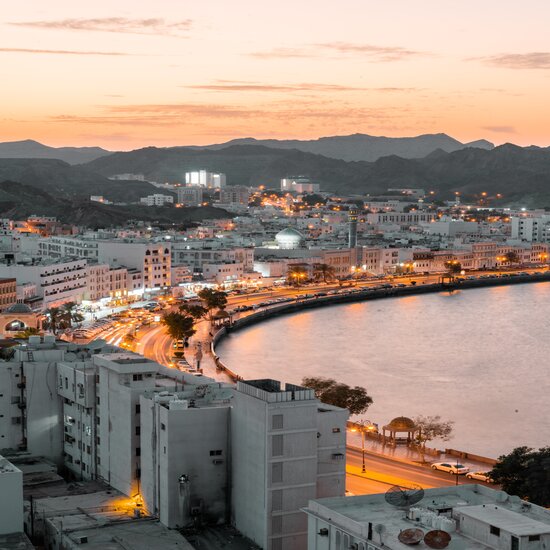Located in Earth’s largest and most populous continent (Asia), the Sultanate of Oman is one of the 22 members of the Arab League which can be found in the Arabian Peninsula.
The country practices what is politically known as diarchy: a combination of two systems of government: unitary and an absolute monarchy.
As complicated as that may sound to people who are not familiar with the politics of the Western Asian country, well…there is still more to that: the Sultan (usually hereditary) has ultimate power over the legislative, executive and judiciary arms of government.
Omani Ministries
There are 23 ministries in Oman supervised by ministers who are appointed through a royal decree by the country’s Sultan. There are other government agencies and departments that also perform arrays of roles in assisting the government to implement policies.
Muscat is Oman’s capital and largest city. The capital city has a population of 1,623,000 (2022), showing a 2.08% increase from the 2021 population figure.
Before the August 2020 royal decree issued by the Asian country’s His Majesty Haitham bin Tariq, there were 27 ministries in Oman, that decree reduced the number of ministries to 23 for more effectiveness in the implementation of the government policies.
The 23 ministries in Oman are:
- Council of Ministers
- Ministry of Labour
- Ministry of Defence
- Ministry of Finance
- Ministry of Royal Office
- Ministry of Interior
- Ministry of Economy
- Ministry of Education
- Ministry of Health
- Ministry of Information
- Ministry of Foreign Affairs
- Ministry of Energy and Minerals
- Ministry of Social Development
- Ministry of Heritage and Tourism
- Ministry of Diwan of Royal Court
- Ministry Justice and Legal Affairs
- Ministry of Culture, Sports, and Youth
- Ministry of Awqaf and Religious Affairs
- Ministry of Housing and Urban Planning
- Ministry of High Education, Research, and Innovation
- Ministries of Agriculture, Fisheries and Water Resources
- Ministry of Commerce, Industry, and Investment Promotion
- Ministry of Transport, Communications and Information Technology
The above ministries have different visions and missions. For instance, the Ministry of Foreign Affairs works towards expanding the country’s tourism by increasing the number of countries that can enter Oman visa-free.
The most important thing is that they all working to drive the collective implementation of policies toward the development of Oman.
For instance, the Ministry of Transport, Communications and Information Technology (MTCIT) is in charge of the supervision of the ports and airports and other national projects that are built to connect Oman with Arab nations, the continent, and the rest of the world.
Most of the projects of the MTCIT and technology-driven to raise income and develop the country economically.
However, the Ministry of Heritage and Tourism also comes in along the way to promote the heritage and culture of the country by tapping from the well-executed projects by the MTCIT, so also the ministry of economy among others.
Ministers in Oman
There are 23 ministers in Oman. They are called the Council of Ministers. Omani Council of Ministers is a body that is charged with the responsibilities of monitoring, coordinating and implementing government policies. Politically, it is the chief executive body of the Sultanate of Oman.
The council of ministers also makes economic, social, security, welfare, and administrative recommendations to the Sultan. The Sultan of Oman presides over meetings of the Council of Ministers.
Out of the 23 ministers, three of them are women who are in charge of 1) Ministry of Education, 2) Social Development, and 3) Higher Education, Research and Innovation.
At the time of compiling this report, the 23 Ministers in Oman and their portfolios are as follows:
| Ministries | Ministers |
| Council of Ministers | Sayyid Fahd bin Mahmoud Al Said |
| Economy | Said bin Mohammed bin Ahmed Al Saqri |
| Defence | Sayyid Shihab bin Tarik bin Taimur Al Said |
| Labour | Mahad bin Said bin Ali Baowain |
| Interior | Sayyid Hamood bin Faisal bin Said Al Busaidi |
| Royal Office | General Sultan bin Mohammed Al Nomani |
| Education | Madiha bint Ahmed bin Nasser Al Shibaniyah |
| Finance | Sultan bin Salim bin Said Al Habsi |
| Health | Hilal bin Ali Al Sabti |
| Heritage and Tourism | Salim bin Mohammed bin Said Al Mahroqi |
| Foreign Affairs | Sayyid Badr bin Hamad bin Hamood Albusaidi |
| Social Development | Laila bint Ahmed bin Awadh Al Najar |
| Energy and Minerals | Salem bin Nasser Al-Awfi |
| Information | Abdullah bin Nasser bin Khalifa Al Harrasi |
| Awqaf and Religious Affairs | Sheikh Mohammed bin Saeed Al Maamari |
| Culture, Sports, and Youth | Sayyid Theyazin bin Haitham bin Tarik Al Said |
| Commerce, Industry, and Investment Promotion | Qais bin Mohammed bin Moosa Al Yousef |
| Diwan of Royal Court | Sayyid Khalid bin Hilal bin Saud Al Busaidi |
| Justice and Legal Affairs | Abdullah bin Mohammed bin Said Al Saidi |
| Agriculture, Fisheries and Water Resources | Saud bin Hamood bin Ahmed Al Habsi |
| Housing and Urban Planning | Khalfan bin Said bin Mubarak Al Shuaili |
| Transport, Communications and Information Technology | Said bin Hamood bin Said Al Mawali |
| High Education, Research, and Innovation | Rahma bint Ibrahim bin Said Al Mahrouqiyah |
Further reading:
- Photo by Anfal Shamsudeen
- Foreign Ministry of Oman. “Ministers’ profiles”. fm.gov.om
- Times of Oman (June 16, 2022). “New Ministers appointed in Oman”. timesofoman.com
- MEED Editorial (January 24, 2011). “Sultanate of Oman ministries”. meed.com


